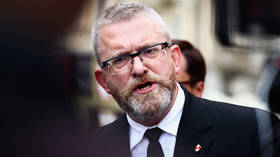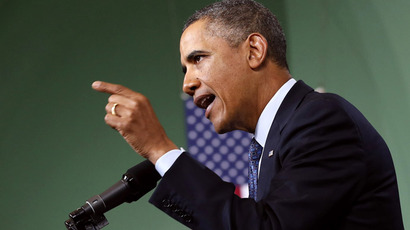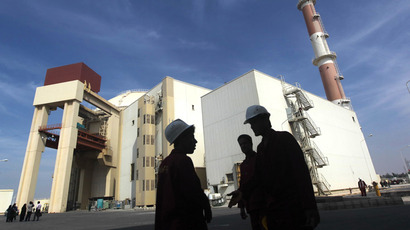P5+1 must win Iran’s trust, hostility is counterproductive – Jalili
Iran’s nuclear talks in Kazakhstan have brought no breakthrough, with Tehran urging the group of six world powers to win the trust of the Iranian people. Hostile rhetoric towards Tehran is ‘counterproductive,’ Iran’s chief negotiator stated.
The process of building trust is “a two-way traffic” and
Tehran “has taken quite a few steps to create trust,” stated
head of Iranian delegation Saeed Jalili, secretary of the country’s
Supreme National Security Council.
“When we talk about building confidence it must not be
translated to be a denial of rights of any nation, rather it must
be related to behavior and conduct that helps to facilitate
cooperation between the two parties,” the official said later,
in an interview with RT Arabic.
While, US Secretary of State John Kerry said that negotiations
with Tehran would continue, but stressed that "this is not an
interminable process."
Saeed Jalili headed the Iranian delegation at the two-day talks in
the Kazakh city of Almaty, which wrapped up on Saturday.
Iran and the 5+1 group - the United States, Russia, China, France,
Britain and Germany – have yet again attempted to come to a
compromise over Tehran’s controversial nuclear program. Iran
maintains that it needs atomic energy for purely peaceful purposes
– such as medicine, energy and science. The international community
has concerns on the matter as the republic’s 20 percent enriched
uranium is just a step away from weapons-grade.
“Over two days of talks we had long and intensive discussions on
the issues addressed in our confidence-building proposal,”
European Union foreign policy chief Catherine Ashton told
journalists. “It became clear that our positions remain far
apart,” she added.
Iran’s Jalili was more positive in his assessment of the gathering.
He admitted that the sides do have some differences. However,
during this latest gathering in Almaty they got a chance to discuss
two different sets of proposals regarding Iran’s nuclear program
that had been put forward by Tehran and the six countries.
Jalili reiterated Tehran’s stance that enrichment of uranium –
“whether we're talking about 5% or 20%” - is the republic’s
“part and parcel.” Still, this issue “may become an element
of building and strengthening confidence,” he noted as cited by
Interfax.

“What goes beyond the needs of Iranian people can be a subject for cooperation, ” the Iranian official later told RT.
Moscow agrees that it is necessary to recognize all rights of the Islamic republic, including its right to enrich uranium in exchange for Iran agreeing to comprehensive control of its nuclear program by the International Atomic Energy Agency (IAEA). Russia considers unfair some views of Western partners regarding the issue, Russian Deputy Foreign Minister Sergey Ryabkov said.
“Russia says clearly the recognition of all rights of Iran under [the Treaty on the Non-Proliferation of Nuclear Weapons,] including the right to enrichment in exchange for the IAEA control over Iran's nuclear program, is the final model. This can be spread out to any depth ,” he said, as cited by Itar-Tass agency. If that deal is reached, all sanctions against Iran should be lifted.
However, the diplomat added that Iran has a different opinion on the succession of steps and uses different terms during the talks. This was the source of the disagreements at the talks in Almaty, Ryabkov observed. But Moscow hopes that the next round of nuclear talks on Iran will bring a breakthrough.
For now, it was agreed that negotiators would go back to their capitals “to evaluate where we stand on the process,” Ashton said, adding that she would be in touch with Jalili "very soon in order to see how to go forward.” So far, no date or place has been set for new talks.
US sanctions yield no results
Tehran believes that the US government should review the tone it
has been using with Iran in past decades.
“The US government must appreciate that the behavior they have
shown in the past decades towards the Iranian people produced
nothing,” Jalili told RT Arabic.
Since the 1979 Iranian Revolution and the overthrow of the Pahlavi
dynasty, “when the Iranian people toppled the dictatorship and
democratically elected their own government, various US
administrations have been hostile to Iranian people,” the
Iranian negotiator said. Particularly within past two years,
Washington has been taking hostile actions against the Islamic
republic, “including the introduction of sanctions,” Jalili
noted.

Iran managed to turn that pressure “into opportunities.” The country progressed in its scientific development and is currently “the 17th largest economy in the world," Jalili said.
In his opinion, the US failed to achieve any success through the path it’s taken. On the contrary, by imposing economic sanctions America “denied opportunities” for its own citizens to do business with “














